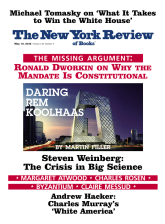In response to:
Our Corrupt Politics: It's Not All Money from the March 22, 2012 issue
To the Editors:
Ezra Klein [“Our Corrupt Politics: It’s Not All Money,” NYR, March 22] finds that a claim that “the rise of money is behind the decline in trust in government” does not “stand up to scrutiny.” It may not. But that is not the claim I make in my book. I cite psychological evidence about the effect of money upon trust not to explain the history of trust, but to explain one component of trust in any historical period. The period I’m focused upon is today. That Watergate may have given Americans another reason not to trust their government in the early 1970s does not weaken the claim that money drives cynicism today.
Likewise, Mr. Klein finds that the claim “that money empowers ideologues and alienates the middle” does not “stand up to scrutiny.” But again, that claim is not my claim. My claim is that the pattern of policy positions taken by both the Democrats and Republicans correlates with the pattern most likely to raise the most money—both parties are in roughly the same position on business issues; both parties take radically different positions on social issues. The evidence Mr. Klein cites shows why that strategy would be so profitable. His evidence supports my claim, rather than refuting it.
Finally, Mr. Klein speculates that “while moneyed interests are decisive in passing laws and influencing provisions that few Americans care about, they’re much weaker on the issues where Americans are actually watching.” Yet he also claims, “That’s not to say that lobbyists and interest groups don’t have a hand in the construction of these laws—before they came to a vote—and don’t have a say in the component parts. They do.”
But if the lobbyists are able to keep, say, single-payer health insurance off the table—as I quote Senator Pressler arguing in the book—then indeed the lobbyists are quite powerful about an issue that most Americans care about. I agree with Klein (and most of political science) that there’s little evidence that the lobbyists affect “which votes ended up in the ‘nay’ column and which ended up in the ‘aye’ column” in a final roll call vote. But if they can control what gets in the legislation and what stays out, why would they need to? They can instead stay hidden and powerful, which is what most special interests would prefer.
Lawrence Lessig
Roy L. Furman
Professor of Law and Leadership
Harvard Law School
Cambridge, Massachusetts
Ezra Klein replies:
Perhaps Professor Lessig did not mean to say that the rise of money is behind the decline in trust in government. But his book argues that the flood of money into the political system generates a “corruption” with “two elements.” The second element, he says, is “when democracy seems a charade, we lose faith in its process.” He also writes that money is “the root, the thing that feeds the other ills, and the thing that we must kill first.”
The polling data I mention simply shows that it is impossible to look at public trust in government and see a clear connection to the rise of what Lessig calls “the fundraising Congress.” As such, it is hard to believe that money is “the root” or the main driver behind our loss of faith in the process. If Lessig is making a more limited claim than I took from the book—that money is one of many things that Americans dislike about the political process—then we do not disagree.
Regarding single-payer health insurance, I simply disagree with Senator Pressler’s assessment of the politics of that issue. Having covered health care politics extensively, I have often heard single-payer supporters argue that the public is really with them and it is lobbyists and fat cats who stand in their way. This is a comforting thought to the policy’s supporters, as it suggests that the public is truly, in its heart of hearts, on their side. But I have spoken to many senators and congressmen who say that the real problem with single-payer is that the American people distrust the government and are deeply opposed to any policy that would take away the insurance they currently possess.
During the 2009 health care debate, a deal was struck with members of the House Progressive Caucus to bring single-payer to a vote in the House of Representatives. It never happened. And not because of interest groups, who had nothing to fear from a symbolic vote on doomed legislation. Rather, a member of the House Progressive Caucus explained to me that it was simply too dangerous a vote for vulnerable Democrats who had to keep both liberals and moderates happy, and too easy a target for surging Republicans who wanted nothing more than to prove that Democrats were really looking to set a government takeover of health care into motion.
For all that, I stand by what I wrote in the original review: Professor Lessig’s book is the single best treatment of the evidence around money in politics, and I recommend it highly.



